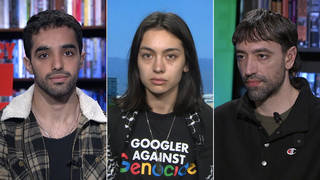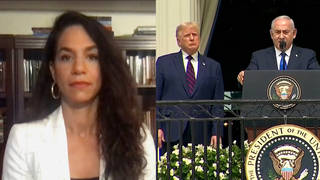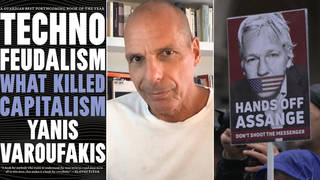
Related
Topics
Guests
- Zainab Alkhawajaa pro-democracy activist in Bahrain who was just released from jail after nearly a year behind bars. Her father, prominent human rights activist Abdulhadi Alkhawaja, remains imprisoned, serving a life sentence.
We go to Bahrain to speak with human rights activist Zainab Alkhawaja, just after she was released from prison by the Bahraini government. “One year in prison is nothing,” Alkhawaja says of her time behind bars. “Because it’s nothing compared to what we’re willing to sacrifice for our goals, for democracy in our country.” On March 3, she could be sent back to prison after appearing in court to face charges of damaging police property, defacing a picture of the king and insulting a police officer. Her father, longtime activist Abdulhadi Alkhawaja, remains behind imprisoned, serving a life sentence. Bahrain is a U.S.-backed monarchy that is home to the U.S. Navy’s Fifth Fleet, which is responsible for all naval forces in the Gulf. Alkhawaja’s release came on the heels of rallies marking the third anniversary of the pro-democracy protests that began on Feb. 14, 2011.
Transcript
AMY GOODMAN: We turn now to the Bahraini human rights activist Zainab Alkhawaja. We spoke with her just after she was released from prison by the Bahraini government after nearly a year behind bars. At the time, she faced a return to prison pending her court appearance on charges of damaging police property, defacing a picture of the king, insulting a police officer. The following day, her case was postponed until March 3rd, next week. Zainab Alkhawaja joined us last Tuesday via Democracy Now! video stream. I spoke with her along with Nermeen Shaikh and began by asking her to talk about how she felt to be free.
ZAINAB ALKHAWAJA: Wow! It feels like a dream. I keep expecting to wake up and see myself inside my cell.
AMY GOODMAN: Talk about your time in prison. You’ve been in prison for almost a year.
ZAINAB ALKHAWAJA: Mm-hmm. Well, what I feel about prison is that it’s a place where they try to break a person. It’s a place where you feel like you can be humiliated at any minute and on any given day. So, it can be a very stressful situation if you don’t look at the bigger picture and the cause that you’re sacrificing for.
My time in prison was a little bit difficult. The prison in Bahrain is a very, very dirty, filthy place. Seeing cockroaches and bed bugs and all kinds of insects is a daily thing. The number of prisoners inside the prison is way too many. We have people sleeping on the ground. There’s not enough beds. The rooms are very small. We cannot move in and out of our cells a lot. And also, we had a very difficult time convincing them to let us go out and get some air and get some sunlight. So, actually, for the first six months in prison, I was not let out of the prison. So sometimes it does feel like a grave.
But when I came out, the first thing I did say was, one year in prison is nothing. And I say that because it’s nothing compared to what we’re willing to sacrifice for our goals, for democracy in our country. And we’re going to continue on this path. We started on a path, and we’re determined to continue on it until we reach our goal.
AMY GOODMAN: What is your goal? What are you calling for?
ZAINAB ALKHAWAJA: We’re calling for a country where every Bahraini is respected, every Bahraini is treated equally. We’re calling for a country where we feel we have rights, where we feel we have dignity, where people can’t step all over us, can’t torture and kill and get away with these things. We’re living in a country, basically, where the criminals are the most powerful people in the country, and where a lot of us actually feel proud when we’re in jail, because we know that in Bahrain, when you go to jail, it means you did something right and not wrong. It should be the other way around. It should be that people who are activists, people who are calling for rights, they should be the ones who are on the outside and working, and criminals, people who are killing, people who are torturing, they’re the ones who should be in jail. But it’s all the other way around. But at the same time, I say that in Bahrain I do not feel pity for all those people who are in prison, all the injured protesters. I feel proud when I see them. I feel pity for our oppressors, because what they do is breaking them inside. We’re not broken. We sacrifice, but we feel proud, and we hold our heads up high.
NERMEEN SHAIKH: Zainab, how do you respond to criticism of the anti-government movement that claims that it’s being funded exclusively by Iran in an attempt to make the region more Shia-sympathetic?
ZAINAB ALKHAWAJA: I mean, in Bahrain, Sunnis and Shias have lived side by side for generations. There’s intermarriage. We have—like, all friends are Sunnis and Shia, and we usually can’t even tell each other apart. The people who are trying to make it into a sectarian thing is the government. They’re the ones who are really trying, putting all their effort into making it a sectarian thing. Another thing is that Bahrainis are very proud Arabs. We have nothing to do with Iran. We started this revolution calling for our rights. I mean, we’ve lived under the same monarchy for more than 200 years. It’s actually—it’s really strange that nothing has happened before. This revolution is long overdue. People are supposed to stand up and call for their rights. It’s the 21st century. Everywhere we go, we see democracy, we see freedom, in other countries. We see civil liberties. And over here, we’re supposed to keep quiet just so that nobody accuses us of doing something just because we’re Shia. I think it makes a whole lot of sense what’s happening in Bahrain. We’re inspired by—we were inspired by what happened in Egypt, and we consider our Egyptian brothers our brothers. And they started this, and the Tunisians, and we’re doing the exact same thing. We’re calling for our rights. We’re calling for a country where we can live freely and with our dignity. This has nothing to do with Shia and Sunni. We want these rights for all Bahrainis, whether they are Shia or Sunni.
AMY GOODMAN: Zainab, talk about your father, Abdulhadi Alkhawaja, who is in prison. He has a life sentence now?
ZAINAB ALKHAWAJA: Yes. My father is sentenced to life in prison. He has now been in prison for almost three years. My father is my rock. He’s one of the strongest persons I have ever known. I have never seen him weak. After three years in prison, he’s as strong as ever. And my father has always been my role model. He’s been a human rights activist for almost all his life. He has been trying to do something not only for our country, but for the region, as well. He had been, before the revolution, been going from country to country throughout the Arab world training people on human rights, on how to write reports about human rights abuses. My father tries to put seeds in the ground, so that some day those seeds would grow into something that would benefit our region and our world. And I really believe in his work. He has been working very hard for the past maybe—more than 20 years. It’s not something that he started doing today and yesterday.
And this is why he’s one of the people that the government has been targeting for a long time and has used this situation now to just give him a life sentence, put him behind bars, so they could silence him. My father is one of the most outspoken people in the country talking about what’s happening here, about conditions here. So, putting him behind bars, I think the only reason for that is to silence him, like they’ve done with other activists, like Nabeel Rajab, for example. They’re behind bars so that there’s no one to represent the people of Bahrain.
But I think what makes us proud is, even though almost all human rights activists are either out of the country or in jail, even though a lot of the civil society leaders are in prison, a lot of the activists are in prison, still the Bahraini people go out, and they protest, and they demand their rights, which is very difficult. When you’re standing there with activists, you know that there’s someone covering what you’re doing, someone there who might try to protect you. But even without this protection, on this past February 14, we saw very, very big numbers of people go into the streets, still making the same demands, showing that they’re not backing down.
NERMEEN SHAIKH: And what are the prospects, Zainab, for any kind of change in Bahrain? What is the state of negotiations between opposition groups and the government? And what prospects do these political prisoners—3,000, you said, including many of your family members—have of being released or having their jail sentences diminished?
ZAINAB ALKHAWAJA: Well, here’s the thing. Prison can be difficult. Actually, it is very difficult. And a lot of people, they want to get out of prison. They want to go to their families. But this is not the end goal. We don’t just want to get out of the small prison into the bigger prison we call Bahrain. Bahrain is a big prison for us. A lot of Bahrainis don’t feel safe until they’re on a plane heading outside of their country, because here in this country you might be arrested on any day. You might get beaten up on any day. So, as a Bahraini, you do not feel safe. So, our end goal—a lot of prisoners say this. They say, “We don’t want to just get out of prison. After three years of suffering, of giving, of doing as much as we can, we want real results. We want democracy. We want to be represented. We want rights.”
And I think that’s why if the government tries to solve the situation just by releasing some political prisoners, that’s not going to be the real solution. The government must give up some of the power and control that they have. And, I mean, the people of Bahrain, they want ultimately to have a full democracy. They want a country where they can vote for a president. The al-Khalifa regime is a regime that has been forced on the people of Bahrain. The al-Khalifa regime is just—is a hereditary regime, and we have no choice in who’s ruling this country. And I think this is one of the biggest problems. This is not something that the people here accept.
AMY GOODMAN: What about the United States, a major force? It has the Fifth Fleet there. What is the role of the United States with the Bahraini monarchy?
ZAINAB ALKHAWAJA: Of course, as you said, the Fifth Fleet is a big part of this. And the relationship between the U.S. and the al-Saud regime, they want to be on their good side, I guess. So, a lot of things together just, they—I guess they don’t see how supporting human rights in Bahrain is going to do them any good. And that’s not how the government of America should be thinking. If they feel like they represent freedom and democracy, they should be thinking first about the people and about the freedom that they’re demanding, about the democracy that they’re demanding, not thinking first about how their interest in the region is served by supporting dictators.
AMY GOODMAN: Bahraini human rights activist Zainab Alkhawaja, just out of jail. March 3rd, she goes to court to see whether she’ll be put back in jail. This is Democracy Now!, democracynow.org, The War and Peace Report. Back in 30 seconds.












Media Options